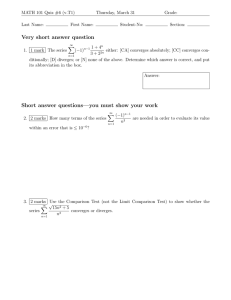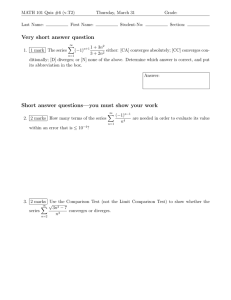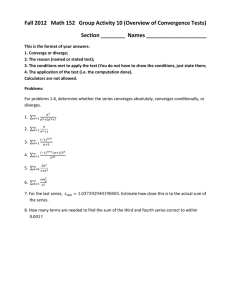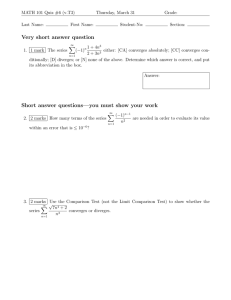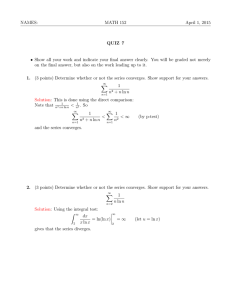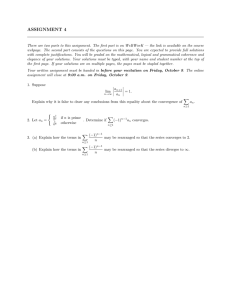Very short answer question
advertisement
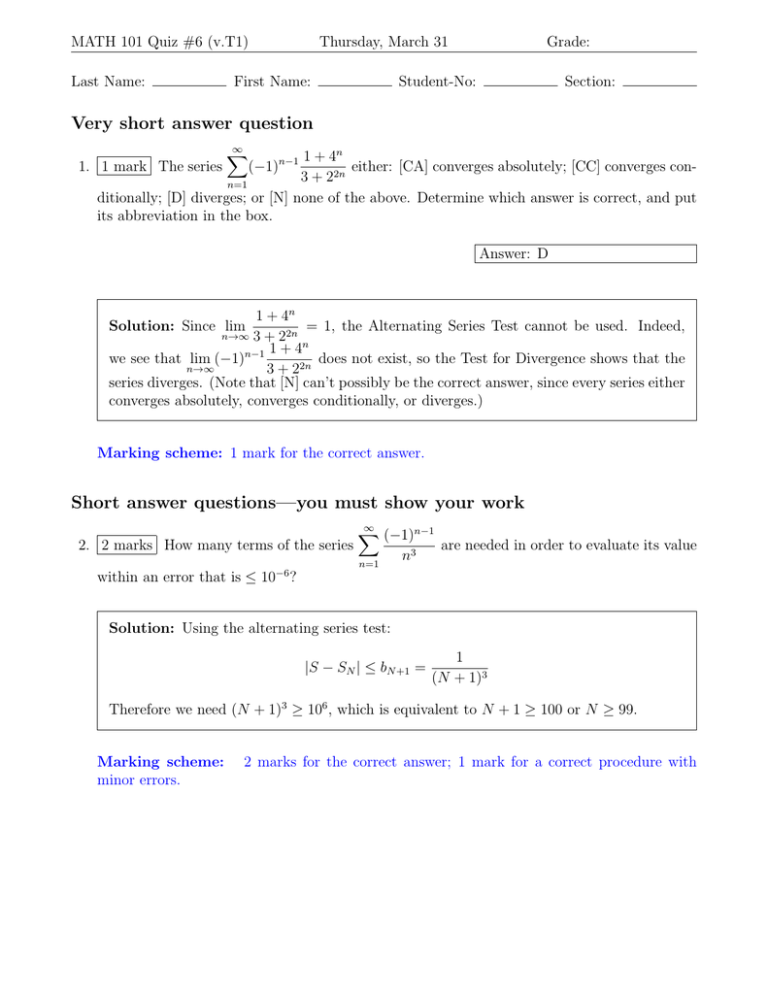
MATH 101 Quiz #6 (v.T1) Last Name: Thursday, March 31 First Name: Grade: Student-No: Section: Very short answer question ∞ n X n−1 1 + 4 1. 1 mark The series (−1) either: [CA] converges absolutely; [CC] converges con3 + 22n n=1 ditionally; [D] diverges; or [N] none of the above. Determine which answer is correct, and put its abbreviation in the box. Answer: D 1 + 4n = 1, the Alternating Series Test cannot be used. Indeed, n→∞ 3 + 22n 1 + 4n does not exist, so the Test for Divergence shows that the we see that lim (−1)n−1 n→∞ 3 + 22n series diverges. (Note that [N] can’t possibly be the correct answer, since every series either converges absolutely, converges conditionally, or diverges.) Solution: Since lim Marking scheme: 1 mark for the correct answer. Short answer questions—you must show your work 2. 2 marks How many terms of the series within an error that is ≤ 10−6 ? ∞ X (−1)n−1 n=1 n3 are needed in order to evaluate its value Solution: Using the alternating series test: |S − SN | ≤ bN +1 = 1 (N + 1)3 Therefore we need (N + 1)3 ≥ 106 , which is equivalent to N + 1 ≥ 100 or N ≥ 99. Marking scheme: minor errors. 2 marks for the correct answer; 1 mark for a correct procedure with 3. 2 marks Use the Comparison Test (not the Limit Comparison Test) to show whether the ∞ √ X 15n2 + 5 converges or diverges. series n2 n=1 Solution: We note that for all n ≥ 1. Therefore, √ √ √ 15n2 + 5 15n2 15 > = 2 2 n n n ∞ X n=1 √ ∞ 15n2 + 5 √ X 1 , > 15 n2 n n=1 which is a divergent harmonic series. By the Comparison Test, the original series also diverges. Marking scheme: 2 marks for the correct answer with valid justification; 1 mark for a correct procedure with minor errors. Long answer question—you must show your work 4. 5 marks Find the interval of convergence for ∞ X 2n n=1 n3 (x − 1)n . Solution: We compute n+1 2 (x − 1)n+1 /(n + 1)3 an+1 = lim lim n→∞ n→∞ an 2n (x − 1)n /n3 n3 = lim 2|x − 1| n→∞ (n + 1)3 n3 = 2|x − 1| lim = 2|x − 1| · 1. n→∞ (n + 1)3 By the Ratio Test, the series converges if 2|x − 1| < 1 and diverges if 2|x − 1| > 1; in other words, the series definitely converges when |x − 1| < 21 , or equivalently 12 < x < 32 . Checking the right endpoint x = 32 , we see that ∞ X 2n 3 n=1 n X ∞ 1 −1 = 2 n3 n=1 n3 is a convergent p-series. At the left endpoint x = 12 , ∞ X 2n 1 n=1 n3 n X ∞ (−1)n −1 = 2 n3 n=1 converges as well (either by the Alternating Series Test, or because the right-endpoint calculation shows that it converges absolutely). Therefore the interval of convergence of the original series is 21 ≤ x ≤ 32 , or [ 12 , 23 ]. Marking scheme: • 2 marks for calculating that the ratio limit is 2|x − 1|, or for calculating that the radius of convergence is 21 . (1 mark for partial progress) • 1 mark for deducing that the interval of convergence includes ( 12 , 23 ). • 1 mark for showing that the left endpoint is included and 1 mark for showing that the right endpoint is included.
